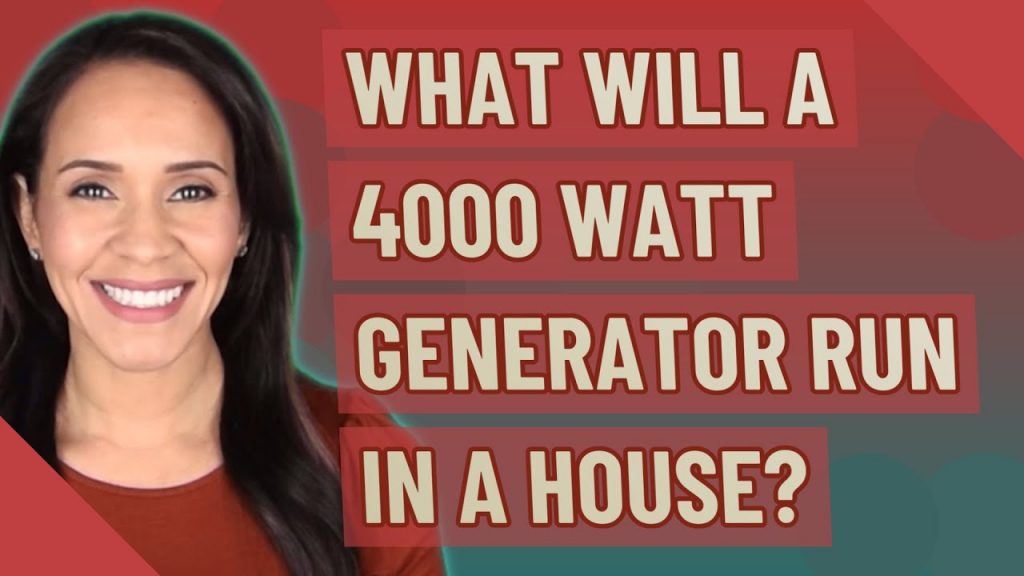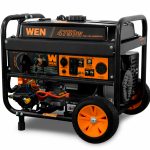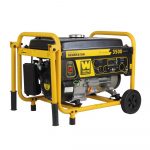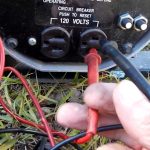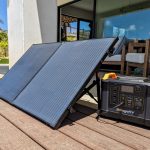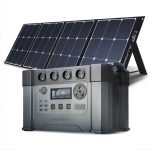When considering running a full house with a generator, the size of your generator is an important factor. A 4000 watt generator is capable of running some basic appliances, but it may not be enough to power a full house. In order to run a full house, you will likely need a generator that is at least 7000 to 10,000 watts. Generators of this size are usually capable of running multiple appliances and larger appliances such as central air conditioning, an electric water heater, and an electric range. It’s important to consider the size of a generator in relation to your home’s energy needs.
If your home requires more energy than your generator can provide, it will not be sufficient to run a full house. The size generator you need also depends on the type and number of appliances you want to run. Some appliances require more power than others, so it’s important to consider how much power you will need. Finally, it’s important to consider how much you are willing to spend on your generator. Generally, the larger the generator, the more expensive it will be. As such, you should consider how much power you need and how much you’re willing to spend before purchasing a generator.
How much does it cost to run a whole house generator for 24 hours?
Running a whole house generator for 24 hours can be an expensive endeavor. A 4000 watt generator is powerful enough to run a house, but it is important to consider how much it will cost to keep it running for a full day. Generally, the cost of running a 4000 watt generator for 24 hours is around $15-$20, depending on the local electricity rates. Additionally, the cost of the fuel needed to power the generator should also be taken into account. The amount of fuel used depends on the size of the generator and the length of time it is running. As such, it is important to check the fuel consumption rate of the specific generator before making a purchase. Finally, while the initial cost of a generator may be expensive, the cost to run it can be offset over time by lower electricity bills.
Can you permanently run a house on a generator?
Yes, it is possible to permanently run a house on a generator. A 4000 watt generator is sufficient to power all the basic necessities of a house, such as lights, refrigerator, and television. However, powering a central heating system or air conditioning system may require more energy and thus a larger generator. It is also important to consider the cost of running a generator all the time. The generator will require regular maintenance and fuel to keep it running. Generators can be a good solution in case of power outages, but it might be a better idea to invest in a reliable power backup system rather than relying completely on a generator.
How many watts does an average house use for a generator?
A typical home uses anywhere from 8,000 to 10,000 watts of power. This means that a 4000 watt generator may be able to run some of the appliances in the home, such as lights, television and a refrigerator, but it would not be sufficient to power the entire home. A typical electric water heater requires about 4500 watts, and an air conditioner uses about 3500 watts. Even the basic lighting and cooking appliances in the home can require between 2000 and 3000 watts of power. All of these appliances combined will require more than a 4000 watt generator can provide.
In order to run a typical home, you would need at least a 10,000 watt generator, or a combination of multiple smaller generators. It is important to remember that in order for a generator to run a home, it must have the capacity to run all of the necessary appliances. If the generator does not have the capacity to run all of the necessary appliances, the home will not be able to function properly. Overall, a 4000 watt generator is not sufficient to run an average home. It may be able to power some of the appliances in the home, but it would not be enough to power the entire home.
How many watts is a normal house?
A normal house typically uses around 1,000 to 2,000 watts of power. This means that a 4000 watt generator can run a normal house, with power to spare. Depending on the size of your house, and the amount of appliances you are running, you may be able to draw even more power from the generator. Running a large house with multiple air conditioners, refrigerators, and other appliances may require up to 3,500 watts of power. In this situation, you may need to upgrade to a larger generator, or reduce the number of appliances running.
Running a 4000 watt generator is possible in a normal house, provided the appliances are not running all at once. If you are looking to power your home with a generator, it is important to calculate the wattage requirements of your home and appliances, to ensure you have the correct size generator for your needs. It is advisable to use a generator with a wattage rating that is slightly higher than the total wattage requirements of your home. This provides a safety margin, and allows for additional electrical appliances. Overall, it is possible to run a normal house with a 4000 watt generator. However, it is important to understand the total wattage requirements of your home, and the size of generator needed to power it.
How many kilowatt generator do you need to run a house?
A 4000 watt generator is capable of running a house, but it depends on the power requirements of the individual home. Generally speaking, a 4000 watt generator is suitable for powering essential items such as refrigerators, lights, and some small appliances. However, for powering other items such as an air conditioner, a much larger wattage generator is recommended. A typical home will require at least 10,000 to 12,000 watts in order to power the entire house. The amount of kilowattage required depends on the number of items that will be powered, as well as the energy efficiency of the appliances.
For example, a newer model air conditioner will require less power than an older model. In addition to the size of the generator, the type of fuel and the frequency of use will also play a role in determining the generator’s efficiency. For example, a generator that runs on gas will require more frequent refueling than one that runs on diesel. Overall, in order to run a house with a 4000 watt generator, one must be aware of the power requirements of the individual home and adjust the generator accordingly. While a 4000 watt generator may be sufficient for powering essential items, a larger kilowatt generator may be necessary in order to power the entire house.
How big of a generator do I need for a 2500 square foot house?
If you’re asking whether a 4000 watt generator can run a 2500 square foot house, the answer is yes – but it will likely have limited power. A 4000 watt generator is capable of powering a good deal of the appliances in a typical home of that size. However, it will not be able to support everything at once. You should consider a larger size generator if you plan on using multiple appliances at the same time, such as a refrigerator, air conditioning, and air heating. A 5000 – 7000 watt generator should be enough to power all of the major appliances in a 2500 square foot house, and provide plenty of additional power for other electronics.
If you are unsure what size generator to buy, it’s best to consult an expert. They can help you determine the best size generator for your needs, and advise you on what type of generator will best meet your needs. No matter what size generator you decide to get, it’s important to keep in mind that a generator is only as good as its maintenance. Make sure you regularly maintain and service your generator to ensure it runs efficiently and safely. Finally, it’s important to remember that a generator is an investment. Make sure to research and compare different generators before making your decision to ensure you’re getting the best deal for your money.
Will a 4000 watt generator run a stove?
No, a 4000 watt generator will not be able to run a house. However, it can be used to power certain appliances such as a stove. This is because stoves typically require less wattage than what is needed to run a house. A 4000 watt generator will be able to provide enough power to run a stove. Keep in mind, however, that a 4000 watt generator won’t be able to power multiple appliances at once.
So if you’re planning on running a stove and other appliances such as a refrigerator or washer at the same time, you may need a generator with higher wattage. It’s also important to note that a 4000 watt generator won’t be able to power an electric stove with an oven attached. If you want to use an oven, you will need a generator with higher wattage. To ensure that your generator is providing enough power for your appliances, you should try to match the wattage of the generator to the wattage of the appliance. If your appliance requires more wattage than the generator can provide, it won’t be able to power it. Overall, a 4000 watt generator will be able to provide enough power for a stove. However, if you want to power other appliances at the same time, or use an electric stove with an oven attached, you will need to find a generator with higher wattage.
Can a 4,000 watt generator run all appliances?
A 4000 watt generator is capable of running a wide range of appliances in a house. It can power everything from lights to air conditioners, refrigerators, and more. However, it is important to note that a 4000 watt generator may not be able to run all appliances in a home at the same time. Depending on the types and sizes of appliances, the total power needs of the home may be higher than what the 4000 watt generator is capable of providing. If you plan to use a 4000 watt generator to power your home, it is important to understand the power needs of your home appliances.
You should also make sure that the generator is powerful enough to handle the total power needs of your home. If not, you may need to invest in a higher wattage generator to ensure that all of your appliances are able to run simultaneously. In general, it is recommended that the size of your generator is at least 20-30% greater than the total power needs of your home. This allows for some extra power to handle any unexpected power demands from your appliances. Ultimately, a 4000 watt generator can be used to power your home, but it may not be able to run all of your home appliances at the same time. Consider your power needs carefully when deciding on a generator, and be sure to invest in a size that is sufficient for your needs.
What situations are 4000 watt generators good for?
A 4000 watt generator can be very useful in a number of situations. It can be used to power essential appliances and electronics during a power outage, or to provide reliable electricity in a remote area. It can also be used to run RV appliances, or to power tools and equipment on construction sites. The question remains if a 4000 watt generator can run a house. The answer is yes, though it is not necessarily the best choice.
A 4000 watt generator is not able to handle the heavy load of a larger home and may not be sufficient to power all of the necessary appliances and electronics. For a smaller home or cottage, a 4000 watt generator may be able to supply enough power. However, it’s important to do some research into the specific wattage requirements of the appliances and electronics in your home in order to make sure a 4000 watt generator can provide enough power. In conclusion, a 4000 watt generator can be a great asset for a variety of situations, but it is important to do some research to determine whether or not it can adequately power your home.
What can you run on a 4K watt generator?
A 4K watt generator is capable of powering a wide range of devices and appliances. It can be used to run lights, fans, small kitchen appliances, and even a small refrigerator. It can even provide enough power to run the essential components of a home, such as a heating and cooling system, a hot water heater, and a sump pump. However, it is important to note that a 4K watt generator is not powerful enough to run an entire house on its own. It is not designed to handle the high load of an entire home, and running one could potentially cause damage to the generator and the appliances being powered.
In order to run a house, a generator with more power output is required. For example, a 7K watt generator can supply enough power to run most of the appliances and devices found in an average home. But if you have a larger home with more electronics, a higher wattage generator will be needed. In general, 4K watt generators are best suited for providing power to small devices and appliances. They are ideal for camping trips, tailgating events, and other situations where a portable source of power is needed. But if you are looking to power an entire household, a higher wattage generator is the way to go.
Can a 4000 watt generator run a microwave?
No, a 4000 watt generator cannot run a house. Typically, a house requires at least 3,500 watts to power basic appliances and up to 20,000 watts to keep the entire home operational. However, a 4000 watt generator can power some basic appliances such as lights, a refrigerator and a microwave. Depending on the wattage of the microwave, it may be able to run it. If the microwave requires more than 4000 watts, then it will not be able to run it.
A 4000 watt generator can also provide enough power to run a furnace, some air conditioners, a computer, and small electric tools. However, if you plan to run a large appliance such as an oven, range, washer, or dryer, the generator needs to have a higher wattage. In conclusion, a 4000 watt generator can run some basic appliances but not an entire house. It can provide enough power to run a microwave, but it depends on the wattage of the microwave. If you plan to run larger appliances, then you need a higher wattage generator.
What can you run on a 3500 watt generator?
It can power most of your small appliances like a microwave, a coffee maker, and a blender. It can also power TVs, computers, and even a small air conditioner. However, a 3500 watt generator is not powerful enough to run a whole house. A 4000 watt generator is the minimum you would need for a home-sized generator and it would be able to power most of the items in the house. If you want to power more items than a 3500 watt generator can handle, you may want to consider a larger generator.
For example, a 7000 watt generator can power larger appliances like a washing machine, furnace, or an oven. Overall, while a 3500 watt generator is a great choice for powering small items, it is not strong enough to run an entire house. To do that, you will need a 4000 watt or larger generator.
What appliances will a 3000 watt generator run?
A 3000 watt generator can be used to power many small appliances in a household such as a refrigerator, some lights, small electronics, and a water heater. However, it is not powerful enough to run an entire house. A 4000 watt generator is typically the minimum required to power a typical home, though it may not be able to power all of the appliances at one time. Typically, a 4000 watt generator will be able to power the refrigerator, a few lights, some small electronics, and possibly a central air conditioner. It may also be able to power some larger appliances such as a washer, dryer, and dishwasher, though you may need to limit the use of these items while they are in operation. In short, a 3000 watt generator is capable of powering many smaller appliances in a home, but is not suitable for powering an entire house. A 4000 watt generator is better suited for this purpose, as it can handle more of the appliances in a typical home.
How many hours will a 5000 watt generator run?
A 4000 watt generator would not be powerful enough to reliably run a house. For this purpose, you would need at least a 5000 watt generator. Generally, a 5000 watt generator can run for up to 8 hours on a full tank of fuel. However, this depends on the load of the generator and other factors. If you are running multiple appliances, then the generator will run for a shorter period of time, as it will need to work harder to power the appliances.
On the other hand, if the load is low, it can easily run for more than 8 hours. It is important to do proper maintenance on your generator in order to ensure that it will run for as long as possible. Regularly inspecting it for any signs of damage, replacing any parts that need to be replaced, and refueling it regularly will ensure that it runs optimally. Finally, it is important to choose the right size generator for your home. A larger generator can handle more load, but it will also be more expensive and consume more fuel. Consider your needs and budget carefully, and make sure to choose the right size generator for your home.
How many volts does it take to make 4000 watts?
A 4000 watt generator is powerful enough to run a typical household. To produce this much power, it requires 4000 watts of electricity, which is equal to 4000 volts. Generators today come with a wide range of wattages, so it is important to make sure you purchase one with the correct voltage output. In general, a 4000 watt generator produces 230 volts of power, which is enough to power most appliances found in the home. However, not all appliances require the same amount of power.
Some devices will require more voltage than what the 4000 watt generator can provide. If you are uncertain about the amount of voltage your appliances need, it is best to consult an expert. A professional electrician can advise you on the best way to get the power you need without overloading your generator. When shopping for a generator, remember that it needs to be strong enough to produce 4000 watts in order to provide enough electricity for your home. It needs to be able to produce at least 4000 volts of power in order to generate the necessary wattage. This is an important factor to consider when selecting a generator for your home. Overall, it takes a generator with a minimum of 4000 volts of power to generate 4000 watts of electricity. It is important to choose the right generator to ensure that your household is running safely and efficiently.
